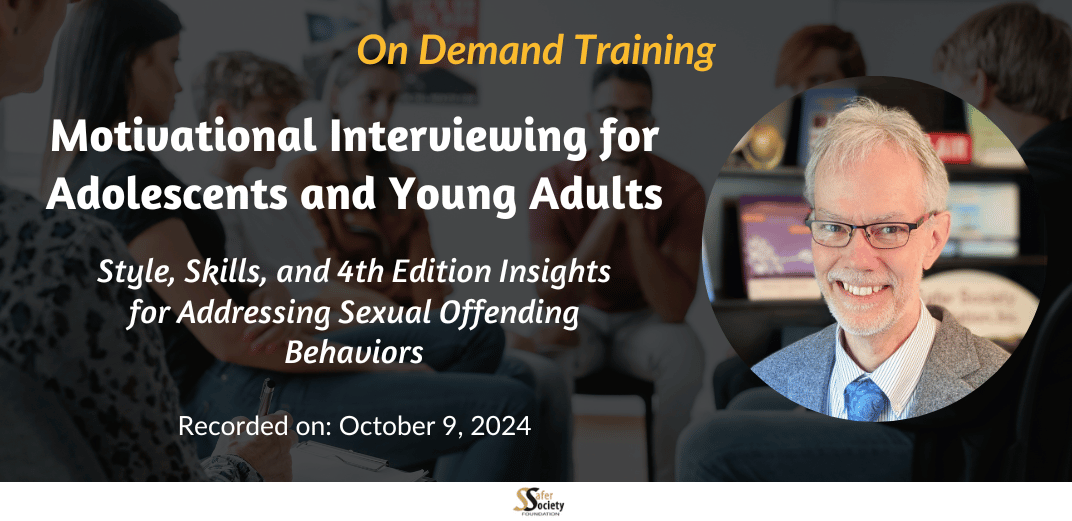
Motivational Interviewing for Adolescents and Young Adults: Style, Skills, and 4th Edition Insights for Addressing Sexual Offending Behaviors
Already purchased an On Demand training?
Click here to access your Safer Society On-Demand Training Center account.
Motivational Interviewing (MI) is an evidence-based approach for facilitating behavior change. As defined in most recent texts, MI is “a particular way of talking with people about change and growth to strengthen their own motivation and commitment.” At its core, MI employs a “guiding” counseling style involving empathy and compassion. Its principles and techniques match those known to produce positive outcomes with individuals who sexually abuse (e.g., Marshall, 2005).
 For adolescents who may feel ambivalent about change or treatment engagement, MI can be particularly impactful. It provides a framework for developing treatment plans, exploring how these clients might feel two ways about engaging in treatment and making changes in their lives. MI can also assist in understanding what is personally meaningful and relevant to people in the wake of involvement with the legal and child welfare systems.
For adolescents who may feel ambivalent about change or treatment engagement, MI can be particularly impactful. It provides a framework for developing treatment plans, exploring how these clients might feel two ways about engaging in treatment and making changes in their lives. MI can also assist in understanding what is personally meaningful and relevant to people in the wake of involvement with the legal and child welfare systems.
The recent publication of MI’s 4th edition marks a pivotal advancement in the field, refining core principles and expanding applications to meet contemporary clinical challenges.
This training offers an in-depth exploration of MI strategies for identifying and exploring client motivations that may not seem evident, particularly among those who seem resistant to treatment. Key topics covered in this training include:
- Exploring Ambivalence: Understanding how to leverage ambivalence in key areas of sexual abuse-specific treatment as a step towards strengthening motivation to change.
- Eliciting Intrinsic Motivation: Techniques for encouraging clients to find their internal motivation to make difficult changes.
- Advanced Reflective Listening: Developing skills that help clients find their own reasons to participate in treatment.
- Constructive Feedback: Strategies for providing feedback—even in challenging circumstances—to facilitate client progress.
- Demonstrating Empathy: Cultivating genuine empathy in interactions with clients who have sexually abused.
During the training, presenter David Prescott reviews four micro-skills and specific techniques involving scaling questions and options menus for engaging clients and focusing on personally meaningful and relevant goals. Some of these skills review a new examination; this includes differentiating between simple and complex affirmations. Prescott also reviews the less-obvious ways that clients indicate that they are considering making changes to their lives and offers skills for strengthening commitment to treatment goals.
By effectively applying these MI principles and techniques, clinicians can significantly enhance treatment outcomes and empower clients to make meaningful and lasting life changes.
1) Identify recent changes outlined in the 4th edition of the primary motivational interviewing book.
2) Demonstrate the four motivational interviewing micro-skills with adolescents and young adults who have sexually abused.
3) Analyze the four processes that make up MI, demonstrating a thorough understanding of their interconnected roles in the MI framework.
4) Develop and apply techniques for eliciting “change talk” among adolescents and young adults with a history of sexual offending behaviors.
Audience
This training is for clinicians, therapists, counselors, social workers, and other professionals who work with adolescents and young adults who have sexually abused or engaged in sexually abusive behaviors.
Content Level
Who's Presenting

David Prescott, LICSW, ATSA-F
A mental health practitioner of 40 years, David Prescott is the Director of the Safer Society Continuing Education Center. He is the author and editor of 25 books in the areas of understanding and improving services to at-risk clients. He is best known for his work in the areas of understanding, assessing, and treating sexual violence and trauma. Mr. Prescott is the recipient of the 2014 Distinguished Contribution award from the Association for the Treatment and Prevention of Sexual Abuse (ATSA), the 2018 recipient of the National Adolescent Perpetration Network’s C. Henry Kempe Lifetime Achievement award, and the 2022 recipient of the Fay Honey Knopp Award from the New York State Alliance for the Prevention of Sexual Abuse and New York State ATSA. He also served as ATSA President in 2008-09. Mr. Prescott currently trains and lectures around the world. His published work has been translated into Japanese, Korean, German, French, Polish, and Southern Tutchone. He has served on the editorial boards of four scholarly journals.
